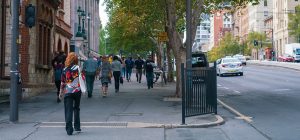Concerns are being raised over the number of licensed venues in Queensland successfully seeking to extend their late-night trading hours, following the lifting of the moratorium in September 2014.
Public health experts claim the end of the liquor licensing freeze has opened the flood gates to extended trading, with 107 applications already received to trade past midnight.
The moratorium on late-night trading applications by licensed venues, first introduced in September 2009 by the Queensland Government, was lifted on 1 September 2014 allowing pubs and clubs across the state to once again apply for extended trading between the hours of 12am and 5am.
Data released by the Queensland Office of Liquor Gaming Regulation, and analysed by the Foundation for Alcohol Research and Education (FARE), reveals that of the applications already received at least 40 have been approved, with the remaining 67 still awaiting approval as at 28 February 2015.
The majority of applications to extend trading hours came from commercial hotels (73). On average, venues requested more than 12 extra trading hours per week, with the majority (68) seeking to trade to 3am in the morning.
In the short time since the Queensland liquor licensing freeze has been lifted licensed venues in the state have already requested a total of 67,184 additional trading hours each year.
FARE Chief Executive Michael Thorn says the analysis highlights how wrong it was for the Newman Government to lift the moratorium last September.
“The previous government would have known there would be an immediate influx of applications for extended trading, which were likely to be approved, and yet was deaf to warnings that lifting the moratorium was likely to increase alcohol-related harm,” Mr Thorn said.
Mr Thorn says all state and territory governments must accept that increasing the availability of alcohol, especially after midnight in entertainment precincts, will increase the risk of harm and act accordingly.
“The lifting of the moratorium in Queensland serves as a lesson to the other states and territories; a reminder of the dangers of ending late-night trading moratoriums or taking measures that effectively weaken them, without first ensuring you have an effective regulatory framework in place. A policy response that sees the pendulum simply swing hard in the opposite direction is not the answer. In this instance, the Queensland Office of Liquor Gaming Regulation has been deluged with applications, and of greatest concern, no applications have been rejected and well over a third of those received have already been approved in the first six months,” Mr Thorn said.
The highest proportion of venues applying to extend their hours were located in two of Queensland’s ‘Safe Night Out’ precincts: Brisbane (35 per cent) and the Gold Coast (15 per cent).
The lifting of the moratorium in September was strongly opposed by the public health sector.
Mr Thorn says that while it is too early to assess the long-term impact of this move, the evidence is very clear that an increase in late-night trading is associated with an increase in alcohol harms.
“It’s very simple. Extend the trading hours of licensed venues, increase the availability of alcohol and Queensland will unfortunately experience a rise in alcohol harms. There is no question. For that reason, I call on the Queensland Government to reintroduce the moratorium on late-night trading ahead of the planned introduction of the 3am last drinks and 1am lockout measures outlined in its Election policy,” Mr Thorn said.
Mr Thorn will deliver an address to surgeons, doctors and health professionals about alcohol research and the importance of translating those findings into effective public policy, at a Royal Australasian College of Surgeons event in Queensland on Sunday 19 July.






